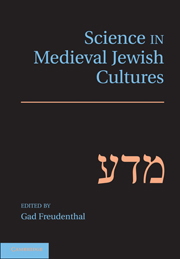Book contents
- Frontmatter
- Contents
- Contributors
- Preface and Acknowledgments
- Introduction: The History of Science in Medieval Jewish Cultures
- Part I The Greek-Arabic Scientific Tradition and Its Appropriation, Adaptation, and Development in Medieval Jewish Cultures, East and West
- Part II Individual Sciences as Studied and Practiced by Medieval Jews
- 5 Logic in Medieval Jewish Culture
- 6 Astronomy among Jews in the Middle Ages
- 7 Interactions between Jewish and Christian Astronomers in the Iberian Peninsula
- 8 The Hebrew Mathematics Culture (Twelfth–Sixteenth Centuries)
- 9 Mathematical and Physical Optics in Medieval Jewish Scientific Thought
- 10 The Evolution of the Genre of the Philosophical-Scientific Commentary
- 11 Latin Scholastic Influences on Late Medieval Hebrew Physics
- 12 Meteorology and Zoology in Medieval Hebrew Texts
- 13 The Mental Faculties and the Psychology of Sleep and Dreams
- 14 Toward a History of Hebrew Astrological Literature
- 15 Astrology in Medieval Jewish Thought (Twelfth–Fourteenth Centuries)
- 16 Astral Magic and Specific Properties (Segullot) in Medieval Jewish Thought
- 17 Medicine among Medieval Jews
- 18 Alchemy in Medieval Jewish Cultures
- 19 The Science of Language among Medieval Jews
- Part III Scientific Knowledge in Context
- Name Index*
- Subject Index*
- References
16 - Astral Magic and Specific Properties (Segullot) in Medieval Jewish Thought
Non-Aristotelian Science and Theology
from Part II - Individual Sciences as Studied and Practiced by Medieval Jews
Published online by Cambridge University Press: 05 June 2012
- Frontmatter
- Contents
- Contributors
- Preface and Acknowledgments
- Introduction: The History of Science in Medieval Jewish Cultures
- Part I The Greek-Arabic Scientific Tradition and Its Appropriation, Adaptation, and Development in Medieval Jewish Cultures, East and West
- Part II Individual Sciences as Studied and Practiced by Medieval Jews
- 5 Logic in Medieval Jewish Culture
- 6 Astronomy among Jews in the Middle Ages
- 7 Interactions between Jewish and Christian Astronomers in the Iberian Peninsula
- 8 The Hebrew Mathematics Culture (Twelfth–Sixteenth Centuries)
- 9 Mathematical and Physical Optics in Medieval Jewish Scientific Thought
- 10 The Evolution of the Genre of the Philosophical-Scientific Commentary
- 11 Latin Scholastic Influences on Late Medieval Hebrew Physics
- 12 Meteorology and Zoology in Medieval Hebrew Texts
- 13 The Mental Faculties and the Psychology of Sleep and Dreams
- 14 Toward a History of Hebrew Astrological Literature
- 15 Astrology in Medieval Jewish Thought (Twelfth–Fourteenth Centuries)
- 16 Astral Magic and Specific Properties (Segullot) in Medieval Jewish Thought
- 17 Medicine among Medieval Jews
- 18 Alchemy in Medieval Jewish Cultures
- 19 The Science of Language among Medieval Jews
- Part III Scientific Knowledge in Context
- Name Index*
- Subject Index*
- References
Summary
Two basic paradigms dominated medieval science. The Aristotelian tradition sought to explain the behavior of substances in the sublunar world solely on the basis of their four elementary qualities (hot, cold, dry, and wet) and the theory of natural places. As Aristotle saw it, there was only one external influence on the material world that was necessary to explain the changes that took place within it: It derived from the sun's changing position with respect to the earth as a result of its motion in its annual orbit. Generation after generation of Aristotelian philosophers subscribed to this framework of scientific ideas.
However, Aristotelian tradition was opposed by other traditions that posited the reality of various kinds of natural powers, such as the influences of the stars on matter and human beings, various magical powers, and the like. These non-Aristotelian traditions concentrated their attention on phenomena (both real and imagined) that could not be attributed to the qualities of matter; in that sense they were supernatural. There was little or no communication between these traditions and the Aristotelian, for the Aristotelians denied the very reality of the powers that were at the core of the non-Aristotelian explanatory schemes.
- Type
- Chapter
- Information
- Science in Medieval Jewish Cultures , pp. 301 - 319Publisher: Cambridge University PressPrint publication year: 2012
References
- 1
- Cited by



